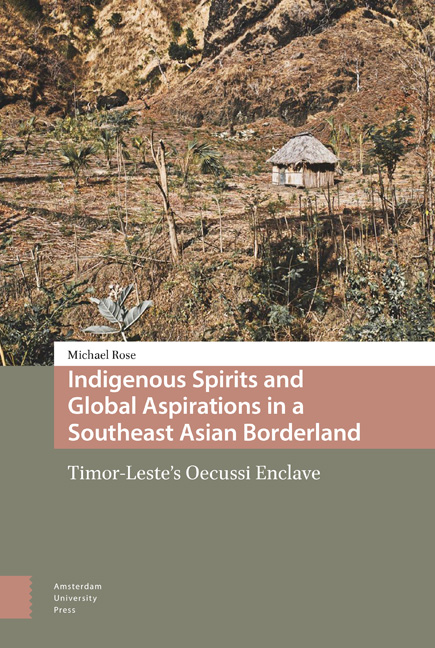 Indigenous Spirits and Global Aspirations in a Southeast Asian Borderland
Indigenous Spirits and Global Aspirations in a Southeast Asian Borderland Book contents
- Frontmatter
- Contents
- List of images
- Map
- A Note On Language
- Acknowledgements
- 1 Frontiers Imagined, Frontiers Observed
- 2 Body and Belief in Timor-Leste
- 3 The Ruin and Return of Markus Sulu
- 4 Angry Spirits in the Special Economic Zone
- 5 Stones, Saints and the ‘Sacred Family’
- 6 Meto Kingship and Environmental Governance
- 7 Ritual Speech and Education in Kutete
- Concluding Thoughts: Encounter, Change, Experience
- Selected Glossary
- Bibliography
- Index
- Miscellaneous Endmatter
1 - Frontiers Imagined, Frontiers Observed
Published online by Cambridge University Press: 21 November 2020
- Frontmatter
- Contents
- List of images
- Map
- A Note On Language
- Acknowledgements
- 1 Frontiers Imagined, Frontiers Observed
- 2 Body and Belief in Timor-Leste
- 3 The Ruin and Return of Markus Sulu
- 4 Angry Spirits in the Special Economic Zone
- 5 Stones, Saints and the ‘Sacred Family’
- 6 Meto Kingship and Environmental Governance
- 7 Ritual Speech and Education in Kutete
- Concluding Thoughts: Encounter, Change, Experience
- Selected Glossary
- Bibliography
- Index
- Miscellaneous Endmatter
Summary
Abstract
An introduction to the text, setting out the intersecting personal, theoretical, geographical and historical frameworks and narratives within which it is set. It introduces the terms kase and meto, the indigenous concepts that are at the theoretical heart of the book.
Keywords: narrative ethnography, Timor-Leste, anthropology, Austronesia
My first encounter with Timor was in a freezing church hall in inner-city Melbourne in 1997. I went there as a sixteen-year-old tutor for St. Vincent de Paul's Friday Night School, a programme intended to get over-privileged private school students like me to teach younger kids from refugee families living in the nearby public housing projects. The children we were tutoring were from an assortment of 1990s warzones – Sudan, Cambodia, and Sri Lanka – but the largest group was from a place called East Timor, a tiny half-island the school atlas showed as part of Indonesia.
These Timorese refugees consisted of several large, visibly struggling families who had escaped in the early 1990s and now lived in high-rise public housing; the sort of place where you would regularly find used syringes in the graffiti-clad lifts and the interior hallways were the same slate grey as the winter sky. Timor, I gathered, was a place with mango trees, warm bucket showers, and cockfights, but from a hall in a housing project mired by Melbourne cold and a heroin epidemic, it was very hard to imagine. Even with the island embroiled in the bloody final act of what was to be a 24-year struggle for self-determination, we didn't talk much about their homeland. There were things I was curious about: I had heard that Luis, the boy I was tutoring, had survived the 1991 Santa Cruz massacre by diving into a cesspit and hiding there until dark while Indonesian soldiers looked for and executed survivors, but fortunately our supervising teacher was wise enough to tell us not to bring it up. I remember once, when a car backfired outside the hall, seeing Luis jump like he’d stepped on a live wire. Clearly there were places beyond peaceful Melbourne that demanded understanding, and I came away from Friday Night School eager not only for knowledge about this other world, but also to learn how those who had come from it made sense of mine.
- Type
- Chapter
- Information
- Indigenous Spirits and Global Aspirations in a Southeast Asian BorderlandTimor-Leste's Oecussi Enclave, pp. 15 - 64Publisher: Amsterdam University PressPrint publication year: 2020


